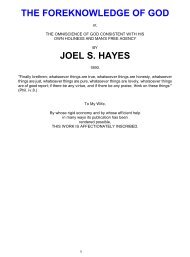Are Men Born Sinners? - Library of Theology
Are Men Born Sinners? - Library of Theology
Are Men Born Sinners? - Library of Theology
You also want an ePaper? Increase the reach of your titles
YUMPU automatically turns print PDFs into web optimized ePapers that Google loves.
Excerpts from Charles G. Finney's Lectures on Systematic <strong>Theology</strong><br />
Preface by the Author<br />
1. To a great extent, the truths <strong>of</strong> the blessed gospel have been hidden under a false<br />
philosophy. In my early inquiries on the subject <strong>of</strong> religion, I found myself wholly unable<br />
to understand either the oral or written instructions <strong>of</strong> uninspired religious teachers. They<br />
seemed to me to resolve all religion into states either <strong>of</strong> the intellect or <strong>of</strong> the sensibility,<br />
which my consciousness assured me were wholly passive or involuntary. When I sought<br />
for definitions and explanations, I felt assured that they did not well understand<br />
themselves. I was struck with the fact that they so seldom defined, even to themselves,<br />
their own positions. Among the words <strong>of</strong> most frequent use, I could find scarcely a single<br />
term intelligibly defined. I inquired in what sense the terms "regeneration," "faith,"<br />
"repentance," "love," etc., were used, but could obtain no answer, at which it did not<br />
appear to me that both reason and revelation revolted. The doctrines <strong>of</strong> a nature, sinful<br />
per se, <strong>of</strong> a necessitated will, <strong>of</strong> inability, and <strong>of</strong> physical regeneration, and physical<br />
Divine influence in regeneration, with their kindred and resulting dogmas, embarrassed<br />
and even confounded me at every step. I <strong>of</strong>ten said to myself, "If these things are really<br />
taught in the Bible, I must be an infidel." But the more I read the Bible, the more clearly I<br />
saw that these things were not found there upon any fair principles <strong>of</strong> interpretation, such<br />
as would be admitted in a court <strong>of</strong> justice. I could not but perceive that the true idea <strong>of</strong><br />
moral government had no place in the theology <strong>of</strong> the church; and, on the contrary, that<br />
underlying the whole system were the assumptions that all government was physical, as<br />
opposed to moral, and that sin and holiness are rather natural attributes, than moral,<br />
voluntary acts. These errors were not stated in words, but I could not fail to see that they<br />
were assumed. The distinction between original and actual sin, and the utter absence <strong>of</strong> a<br />
distinction between physical and moral depravity, embarrassed me. Indeed, I was<br />
satisfied either that I must be an infidel, or that these were errors that had no place in the<br />
Bible. I was <strong>of</strong>ten warned against reasoning and leaning to my own understanding. I<br />
found that the discriminating teachers <strong>of</strong> religion were driven to confess that they could<br />
not establish the logical consistency <strong>of</strong> their system, and that they were obliged to shut<br />
their eyes and believe, when revelation seemed to conflict with the affirmations <strong>of</strong><br />
reason. But this course I could not take. I found, or thought I found, nearly all the<br />
doctrines <strong>of</strong> Christianity embarrassed by the assumptions above-named. But the Spirit <strong>of</strong><br />
God conducted me through the darkness, and delivered me from the labyrinth and fog <strong>of</strong><br />
a false philosophy, and set my feet upon the rock <strong>of</strong> truth, as I trust. But to this day I meet<br />
with those who seem to me to be in much confusion upon most <strong>of</strong> the practical doctrines<br />
<strong>of</strong> Christianity. They will admit, that sin and holiness must be voluntary, and yet speak <strong>of</strong><br />
regeneration as consisting in anything but a voluntary change, and <strong>of</strong> Divine influence in<br />
regeneration, as anything but moral or persuasive. They seem not at all aware <strong>of</strong> what<br />
must follow from, and be implied in, the admission <strong>of</strong> the existence <strong>of</strong> moral government,<br />
and that sin and holiness must be free and voluntary acts and states <strong>of</strong> mind. In this work<br />
I have endeavored to define the terms used by Christian divines, and the doctrines <strong>of</strong><br />
Christianity, as I understand them, and to push to their logical consequences the cardinal<br />
admissions <strong>of</strong> the more recent and standard theological writers. Especially do I urge, to






